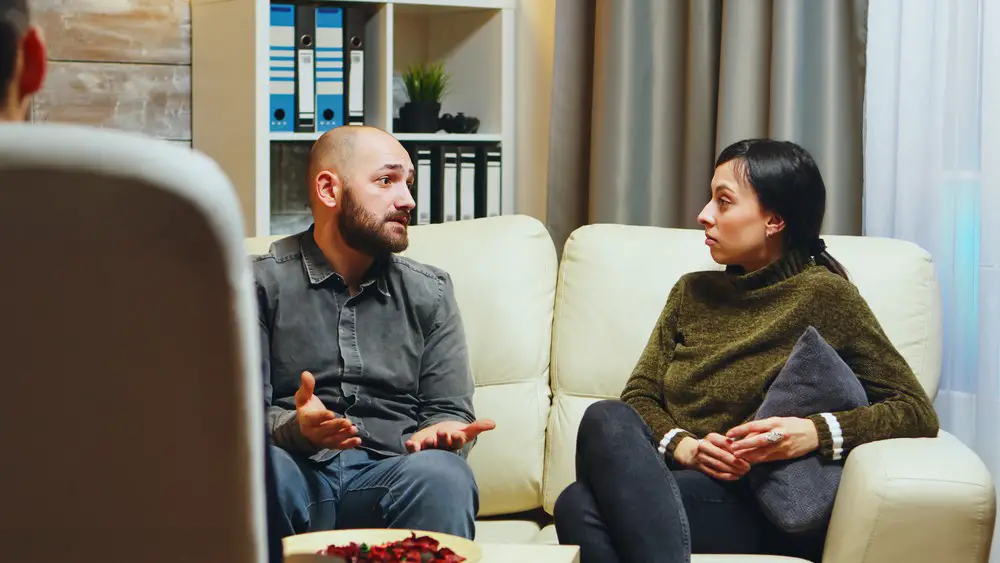As a BetterHelp affiliate, we receive compensation from BetterHelp if you purchase products or services through the links provided
Marriage is supposed to be your day to shine in the sun—the happiest day of your life. Unfortunately, it doesn’t always end up that way, and too often, it’s easy to get mired in the depth of depression for various reasons.
Depression after your wedding? Who in the world would be depressed after getting married? It sounds outlandish—even a little crazy—at least for those who haven’t walked down the aisle or stood waiting at the altar.
Depression is a recognized mental disorder, but that doesn’t mean it’s limited to chronic circumstances only. Depression can also be an acute issue, and it can happen after your wedding day for a surprising number of reasons.
1. Wedding Didn’t Go As Planned
No battle plan survives the first skirmish. Maybe there was an unwelcome guest there. Maybe the wedding dress wasn’t correctly fitted. Perhaps the wedding photographer didn’t show up on time, and their photography skills were a bit questionable when they did.
A hundred thousand things could go wrong in any planned event but especially in something so studiously planned as a wedding. What begins as agitation and irritability devolve into downright depression. Ultimately, depression over the wedding will often turn into guilt. On and on, the circle goes.

2. New Marriage Challenges
Everything changes after a wedding. The bride has to file for a name change on everything, her financial status changes, and even her taxes are fundamentally altered in more ways than you can imagine. The US tax code takes up several bookcases, after all. The bride has to file for a name change on everything, financial status change, and even her taxes are fundamentally altered in more ways than you can imagine. The US tax code takes up several bookcases, after all. It’s nothing a good tax estimator can’t handle, though.
As a single individual, challenges in the road ahead are far more difficult when you have two people to think about, perhaps even kids or plans for kids. It can get quite convoluted when you stop and consider the implications of what you just signed up for. Depression is a natural side-effect.
3. The aftermath of All the Hype and Build-Up
You spent months, possibly even years, charting the course of the wedding. Everything from the number of tiers on the wedding cake to the intricate specifics of the bridesmaid’s dress and the lighting.
All of that is over now. All of the build-up—all of the gatherings, phone calls into the wee hours of the morning, pouring over thousands of websites for ideas—everything. Once all of that is gone, it tends to leave behind a gaping void within, an absence of something to do, regardless of what you do for a living.
4. Reality of Ordinariness
One of the false assumptions or feelings that creep in post-wedding is the idea of leading a straight, narrow, ordinary life from this point forward. The party days are over, and we all tend to go through the purposeful lack of responsibility phase as youngsters.
Of course, no one can predict the future, and married life is often everything except ordinary. However, it’s easy to get caught up in the picturesque assumption that married life is the definition of dullness.
5. No More Spotlight
This isn’t an accusation of self-indulging. On the contrary, you may be the most selfless person in the world, but at the end of the day, you must admit that the bride and groom, especially the bride, are the absolute pinnacle of everyone’s attention for weeks. This is especially true on that one memorable day.
And then, it’s over—gone, done with. All you’re left with is a sense that no one is paying attention to you anymore. So, even if you weren’t the type of person needing attention initially, it would still have an effect.
6. Assumption of Happiness
This is more of a play-off of the above scenarios. You assume you are supposed to be happy immediately after a wedding because we all do. How can anyone imagine not being happy after our wedding day?
That assumption and the following depression, for one of the above reasons, leads to a terrible feeling of guilt and perhaps even inadequacy, especially if your partner has no such hang-ups.
7. Situational Grief
This is an all-encompassing deal precisely because it’s situational. It could be any number of things happening to brides or grooms. The only reason it’s on the list is that things happen, even on wedding days, and situational grief might play a role.
It’s not something you can nail down and quickly define, but it plays off of your relationship. Depression, even if acute, affects your relationship, and your relationship affects your stress, anxiety, and depression.

Dealing with Post-Marital Stress and Depression
Life is an adventure. We handle bad scenarios, depression, guilt, and anxiety differently. Still, We think about this: What story or movie have you seen where the protagonist didn’t face difficulty? If you have seen one, it was probably a poorly written-flick.
Just because you got married doesn’t mean that it’s the end of the adventure. On the contrary, you’re about to experience an entirely new adventure, with different challenges, a partner this time where before you had none, and new friends will come and go.
Set Yourself Some Goals
Just because you are now married doesn’t mean that all of your goals and aspirations just went out the window. Set yourself some new ones or resurrect old ones that may now be more attainable with your adjusted finances.
Focus on the adventure of life, with both the good and the bad.

Save 10% with code: RestEquation
Give Therapy a Try
If you can’t seem to dredge yourself out of the muck, you may consider a therapy session with someone who will help you readjust your new focus.
Many view therapy as a weakness or a sign that things have gotten so bad that it has all come down to this. That’s an unnecessary way of viewing things. Therapy can have actual and long-lasting results; you don’t have to reach the bottom before reaching out.
Final Thoughts
There you have it—seven common reasons people struggle with depression after getting married. It happens. It may not be because you got married, but it is an underlying thing for which you need to reach out to someone who can help.
Even if you’re a cup is half empty kind of person, there are more ways than one to change your outlook. Never hold it all in. Instead, reach out to your new partner, friends, family, and perhaps a professional who can help you chart your new path forward.
- 7 Ideas to Help You Relax and Unwind on a Family Vacation - April 27, 2025
- How Having Cybersecurity Protection Helps You Relax - April 25, 2025
- 8 Reasons Why Spending Time Outside Calms You Down - April 25, 2025
This site contains affiliate links to products. We will receive a commission for purchases made through these links.



